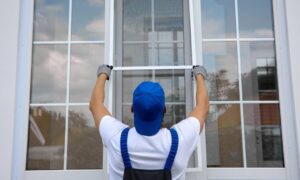In today’s world, energy efficiency is more important than ever. Homeowners are increasingly looking for ways to reduce their energy consumption, lower utility bills, and lessen their environmental impact. One of the most effective ways to achieve these goals is by upgrading your home’s windows. Modern window replacements not only enhance the appearance of your home but also play a crucial role in improving energy efficiency. In this article, we’ll explore the impact of modern window replacements on energy efficiency and how they can benefit your home.
Understanding Energy Loss Through Windows
Windows are a significant source of energy loss in most homes. According to the U.S. Department of Energy, heat gain and loss through windows account for 25% to 30% of residential heating and cooling energy use. This means that inefficient windows can make your home less comfortable and more expensive to maintain.
There are several ways in which windows contribute to energy loss:
- Heat Transfer: During the winter, heat escapes from the interior of your home through windows, while in the summer, heat from the outside enters your home through the same windows. This heat transfer forces your heating and cooling systems to work harder to maintain a comfortable indoor temperature.
- Air Leaks: Older windows often have gaps, cracks, or poor seals that allow air to leak in and out of your home. These air leaks can create drafts, making your home feel colder in the winter and hotter in the summer, again leading to increased energy consumption.
- Solar Heat Gain: In the summer, sunlight entering through windows can cause your home to overheat. This phenomenon, known as solar heat gain, increases the demand on your air conditioning system.
Addressing these issues through window replacement can significantly reduce energy loss and improve your home’s overall efficiency.
The Benefits of Modern Window Replacements
Modern windows are designed with energy efficiency in mind, incorporating advanced technologies and materials that help minimize energy loss. Here’s how these windows can make a difference:
- Enhanced Insulation with Double- or Triple-Pane Glass
One of the most significant advancements in modern window technology is the use of double- or triple-pane glass. Unlike single-pane windows, which offer minimal insulation, double- and triple-pane windows have multiple layers of glass separated by insulating gas fills, such as argon or krypton.
- Double-Pane Windows: These windows consist of two layers of glass with a sealed space between them. The space is often filled with an inert gas that provides additional insulation, reducing heat transfer and improving energy efficiency.
- Triple-Pane Windows: Triple-pane windows take insulation a step further by adding a third layer of glass. This extra layer, combined with two insulating gas-filled spaces, offers superior thermal performance, making these windows ideal for extreme climates.
By reducing heat transfer, double- and triple-pane windows help maintain a consistent indoor temperature, reducing the workload on your heating and cooling systems and lowering your energy bills.
- Low-E Glass Coatings for Optimal Energy Efficiency
Another key feature of modern windows is Low-E (low-emissivity) glass coatings. Low-E coatings are microscopically thin layers of metal or metallic oxide applied to the glass surface. These coatings are designed to reflect infrared and ultraviolet light while allowing visible light to pass through.
- Reflecting Heat: In the winter, Low-E coatings reflect heat back into your home, keeping it warmer without requiring additional energy. In the summer, these coatings reflect heat away from your home, preventing solar heat gain and keeping your interior cooler.
- Blocking UV Rays: Low-E coatings also block harmful UV rays, which can cause fading and damage to your furniture, carpets, and other interior items. By protecting your belongings, these coatings help preserve the aesthetics and value of your home.
Low-E glass is available in various types, with different levels of reflectivity and thermal performance. Choosing the right Low-E coating for your windows can significantly enhance your home’s energy efficiency.
- Improved Frame Materials for Better Insulation
The material used for window frames also plays a crucial role in energy efficiency. Modern window replacements offer a variety of frame materials, each with its own insulating properties:
- Vinyl Frames: Vinyl is a popular choice for window frames due to its affordability, low maintenance, and excellent insulating properties. Vinyl frames are resistant to moisture and do not warp, making them a durable and energy-efficient option.
- Wood Frames: Wood frames offer natural insulation and a classic aesthetic. However, they require regular maintenance to prevent rot and decay. Modern wood frames often feature aluminum or vinyl cladding on the exterior to improve durability while maintaining the insulating benefits of wood.
- Fiberglass Frames: Fiberglass is a highly durable material that offers superior insulation and minimal expansion and contraction with temperature changes. This stability makes fiberglass frames an excellent choice for energy efficiency.
- Composite Frames: Composite frames are made from a combination of materials, such as wood fibers and polymer resins. These frames offer the insulation of wood with the durability and low maintenance of synthetic materials.
By choosing windows with energy-efficient frame materials, you can further reduce heat transfer and improve your home’s overall energy performance.
- Advanced Weatherstripping and Sealing
Modern windows are designed with advanced weatherstripping and sealing technologies that minimize air leaks and prevent drafts. Weatherstripping is applied around the edges of the window sash to create a tight seal when the window is closed.
- Multiple Layers of Sealing: Modern windows often feature multiple layers of weatherstripping, which work together to block air infiltration and improve energy efficiency. These seals are made from durable materials that resist wear and tear over time.
- Improved Window Locking Systems: Newer window designs also incorporate improved locking mechanisms that help create a tighter seal when the window is closed. This not only enhances security but also reduces the likelihood of air leaks.
By preventing air leaks, modern windows help maintain a consistent indoor temperature, reduce energy consumption, and enhance overall comfort.
- Maximizing Natural Light with Energy-Efficient Windows
One of the advantages of modern window technology is the ability to maximize natural light without compromising energy efficiency. Larger windows, combined with advanced glass coatings, allow more natural light into your home, reducing the need for artificial lighting during the day.
- Daylighting Benefits: By optimizing natural light, energy-efficient windows can contribute to a brighter, more inviting living space. This not only reduces your reliance on electric lighting but also enhances your mood and well-being.
- Strategic Window Placement: When replacing windows, consider the orientation of your home and the placement of each window. South-facing windows, for example, can capture more sunlight during the winter, while east- and west-facing windows can provide morning and afternoon light, respectively.
By incorporating energy-efficient windows into your home design, you can enjoy the benefits of natural light while maintaining a comfortable indoor environment.
The Long-Term Impact of Window Replacements
Investing in modern window replacements is a smart decision that offers long-term benefits for both your home and the environment. Energy-efficient windows can significantly reduce your heating and cooling costs, leading to substantial savings over time. Additionally, by reducing your energy consumption, you’ll also be lowering your carbon footprint, contributing to a more sustainable future.
Moreover, new windows can enhance the value of your home. Prospective buyers are increasingly looking for energy-efficient features, and updated windows can make your property more attractive in a competitive real estate market.
Conclusion: Upgrade Your Home with Energy-Efficient Windows
Maximizing energy efficiency in your home starts with choosing the right windows. Modern window replacements, with their advanced glass technologies, improved frame materials, and superior sealing systems, offer a powerful way to reduce energy loss and create a more comfortable living environment.
If you’re considering upgrading your windows, working with an experienced remodeling contractor like Sunrise Remodelers can help you select the best options for your home. With the right windows, you can enjoy lower energy bills, increased comfort, and enhanced property value for years to come.
Read More From Techbullion And Businesnewswire.com



































